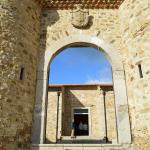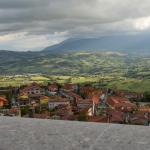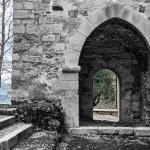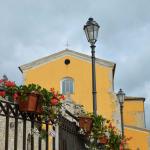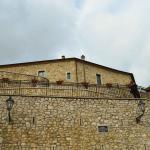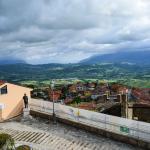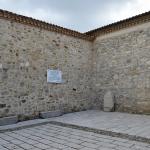The Municipality of Morra De Sanctis is located in the Upper Irpinia area. It's a town with 1,197 inhabitants, located 863 metres above sea level, at 62 km from Avellino. The territory extends for 30.41 sq km and the adjoining municipalities are: Andretta, Conza della Campania, Guardia Lombardi, Lioni, Sant'Angelo dei Lombardi and Teora. It's crossed by the great Ofanto river.
The etymology of the name seems to come from the term morra, meaning "hill", "mound", "pile of stones"; while the specification is linked to the surname of the great statesman, Francesco De Sanctis, native of the village. The inhabitants are called Morresi and Saint Rocco is their patron.
PLACES OF INTEREST
- Castle of the Biondi Morra Princes - Splendid manor built in the Lombard period, then rebuilt in the Norman age and enlarged during the Swabian domination
- Church of Santi Pietro e Paolo (Saints Peter and Paul) - Mother Church built in the 11th century, just below the Castle, it's visible from afar due to its massive size
- Civic Museum Antiquarium - Inaugurated in 2007 within the local municipal office, the exhibition illustrates the results of archaeological research in the territory of Morra, with particular reference to the oldest tombs
- Molinari Palace - Built in the 18th century and characterized by the skilful use of stone, it's one of the most interesting historic buildings in Morra
- De Sanctis Palace - Located in the historic centre with a typical stone portal, it's the birthplace of Francesco De Sanctis (1817-1883)
- Museum of De Sanctis Memories - Set up as part of the initiatives of the "Francesco De Sanctis" Literary Park (1999/2001), the Museum houses a small collection of De Sanctis memories and relics
- Other - De Rogatis Palace, Del Buono Palace, Donatelli Palace, Croce dei Piani, Church of Mount Carmel, Church Presentazione di Maria (Presentation of Mary), Church of S. Lucia (Saint Lucy), Church of S. Maria di Monte Castello, Church of S.Rocco (Saint Roch), Church of Santi Pietro e Paolo, Church of Montecalvario, Donatelli Mill
EVENTS
- Salted codfish Festival - Food and wine event, also called "Feast of the Emigrant", which takes place in August with food stands, music, entertainment and typical local products
- Chalices under the Stars - Event at the Biondi Morra Castle, with astronomical observation, wine tasting and music
TYPICAL FOOD AND PRODUCTS
- Ualanegna salted codfish - Despite the mountain area, in Morra there is a real "cult" of salted codfish, typically prepared with cruschi peppers
- Migliazza con le Cicciole - Ancient and typical rustic pizza made with tripe and corn
- Ricotta di Carmasciano PAT - White, with a soft and creamy consistency, obtained from the residual whey from the processing of the homonymous pecorino, very valuable
- Caciocavallo Silano PDO - Semi-hard cheese, with spun curd, produced with milk from different breeds of cows, including Podolica
- Caciocavallo irpino di grotta PAT - Spun curd cheese, produced with milk from small and medium-sized farms, mainly from brown cattle, traditionally aged in caves
FUN FACTS
Morra De Sanctis was the birthplace, on the 28th of March 1817, of Francesco De Sanctis: writer, literary critic, politician, Italian philosopher, advocate of the institutes of enology in the Irpinian area and of the historic Avellino-Rocchetta railway.
HISTORICAL NOTES
Although it's difficult to accurately rebuild the historical period in which the first settlements were established in the current territory of Morra De Sanctis, the numerous artefacts found in Piano di Cerasuolo (Chànu Cirasùlu for the Morresi), some of which even date back to the civilization of Oliveto Citra-Cairano, suggest the existence of a primordial inhabited centre as early as the seventh century BC.
During its medieval history, Morra De Sanctis suffered numerous enemy raids and was shaken by three earthquakes between the 9th and 11th centuries, a period in which it became one of the fortified castles in defence of the Gastaldate of Conza. The fiefdom was subsequently owned by the Morra, Zurlo, Caracciolo and again Morra families, whose members administered it until the abolition of feudalism, which took place in 1806.
In 1934, the Municipality of Morra Irpina changed its name to the current one, in honour of the great writer and literary critic Francesco De Sanctis, native of the town.
Morra De Sanctis is an intertwining of places and literature, and a guardian of milestones of Italian culture
Morra De Sanctis
Piazza Francesco De Sanctis, 83040 Morra De Sanctis AV, Italia
Did you like it? Leave a review
Your opinion is important! It will be visible after approval by the editorial staff.
To post a comment you must be an authenticated user. Log in with Social Login
